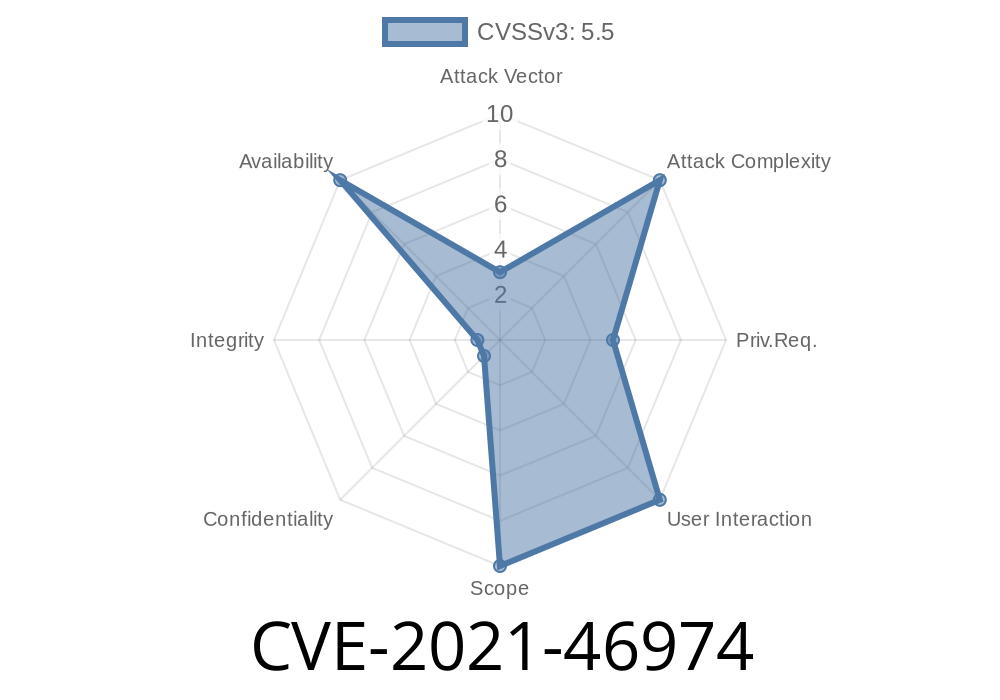In early 2021, a subtle but critical vulnerability surfaced in the Linux kernel's BPF (Berkeley Packet Filter) subsystem: CVE-2021-46974. This issue, hidden behind low-level pointer arithmetic, could have allowed attackers to exploit the way the kernel evaluated certain BPF expressions. Let’s break down everything you need to know about it, in straightforward terms—plus you’ll see actual code, real references, and understand how it could be exploited.
🌟 What is CVE-2021-46974?
CVE-2021-46974 is a vulnerability discovered in the Linux kernel, specifically in the way it handled negation logic in pointer arithmetic for BPF programs. In technical terms, when BPF calculated offsets for pointers, it sometimes did the logic backwards, leading to possible security breaches… but what does this mean in practice?
BPF in a Nutshell
BPF is a powerful technology inside the Linux kernel—mainly used for filtering network packets, but it’s grown to support tracing and secure kernel-level programming. Because BPF programs run close to the kernel core, any weakness there could easily compromise the whole system.
🔍 Details: Where Did It Go Wrong?
The problematic code resided in how BPF verified pointer arithmetic—an operation where it calculates memory locations by adding or subtracting offsets. In some cases, the kernel tried to “invert” an operation (from ADD to SUB or vice versa) for security purposes, but the logic failed if the offset was stored in the destination register.
Here’s the original problematic idea
- If you have something like ptr = ptr + offset or ptr = ptr - offset, you might want to invert the operation, e.g., for validation or to sanitize possible attacks.
- However, you can’t always just swap add and sub if the number (offset) is sitting in the same place as the result.
What was supposed to happen?
The kernel should take an offset from a register, mask it (sanitize it), and then safely apply it to a pointer after inverting if needed. What it did instead was sometimes mixing up that logic—leading to bugs or even the chance to bypass security checks.
🛠️ The Fix
The actual patch (from kernel commit 62fe8c) changes the flow:
> *"Perform the final bitwise and-op unconditionally into AX from the off_reg, then move the pointer from the src to dst, and finally use AX as the source for the original pointer arithmetic operation..."*
Let’s see a simplified code snippet, inspired by the patch
// Old flawed logic (simplified)
if (negate) {
dst += off_reg; // addition
dst -= off_reg; // or, attempted 'inversion'
}
// Fixed logic
AX = off_reg & MASK; // always mask into AX
dst = src; // move pointer into dst
dst += AX; // use safe, masked offset
Here, the mask makes sure only safe values are applied, and the sequence avoids wrong “inversions”.
Trick the kernel into computing a pointer offset incorrectly.
- Bypass a masking/security operation meant to stop access to forbidden memory.
Access arbitrary memory if kernel protections are now ineffective.
The real exploit would be *very* low-level and complex, but this kind of bug is a goldmine for kernel exploit developers—especially as BPF is exposed in modern cloud and container environments.
📰 References and Proof
- NVD: CVE-2021-46974
- Kernel Patch Commit
- BPF Verifier Docs
- BPF Security Practices
🚦 Bottom Line
CVE-2021-46974 is a textbook example of how subtle logic bugs in security operations can open up deep vulnerabilities—even in supposedly safe systems like the Linux kernel. If your workloads depend on BPF, ensure your kernel is patched, and always keep an eye on the security notes in kernel releases!
For more hands-on code and patch viewing, check the original commit and official CVE report.
Timeline
Published on: 02/27/2024 19:04:07 UTC
Last modified on: 01/09/2025 15:00:55 UTC
